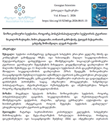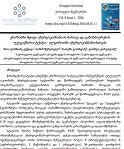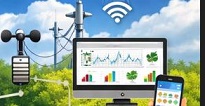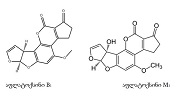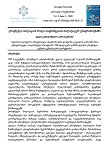ASPECTS OF THE IMPACT OF INFORMATION COMMUNICATION TECHNOLOGIES ON ADOLESCENTS
Downloads
It should be noted that in order to achieve an effective pedagogical impact on the adults, it is necessary to have scientific knowledge about their individual characteristics, the objectivity of which depends on how objective and scientific methods are used to obtain this knowledge. The specificity of psychological and pedagogical testing lies in the systematic analysis of the phenomena of adult development. The global goal of modern education is to set conditions for finding a humane approach to adult development. Our study focuses on the fact that the achievements of information and communication technologies are used directly or indirectly in any scientific field, at the current stage of the development of society. Today, it is impossible to neglect the presence of necessary hardware and software tools in the field of education. The paper demonstrates that mastering diagnostic psychological and pedagogical methods based on information and communication technologies is a pressing challenge in the field of education in the contemporary context. The paper focuses on the use of information and communication technologies in education, which is entirely due to the establishment and development of the information society. Introducing these technologies into the education system allows accelerating the transfer of knowledge and the accumulated technological and social experience of mankind as well as improves the quality of teaching and education. It is an important factor for building an education system that meets the requirements of the information society. The article deals with the topical issues on the impact of information and communication technologies - in particular, with the social and psychological aspects of the adults working on the computer. A survey was conducted among 186 students aged 16-20 (boys and girls) aiming to identify the extent of using the computer among the interviewees by gender. The paper analyzes the peculiarities of adult work on personal computers such as computer use for scientific purposes, for study, for leisure, for social networks, etc. A comparative analysis of different types of activities (eating, drinking, and listening to music with headphones) while working with the computer was carried out according to the levels of computer usage: low, medium and high. The study identified the duration of watching television and walking in the fresh air as well as the amount of night sleep among the adults depending on the computer usage. It also provided an analysis of complaints and adverse clinical manifestations caused by long-term computer use. We tried to demonstrate how necessary it is to introduce modern computer methods, which specifically facilitate the task of routine control of achievement level and learning dynamics. The paper also demonstrates the impact of information and communication technologies on the process of educating and developing the student as it changes both the scheme of knowledge transfer and teaching methods. In addition, introducing information and communication technologies into the education system not only affects educational technologies, but also brings some novelties into the education process. The article emphasizes the ways of how to introduce the information and communication technologies into the education system:
- The primary way is the one that is related to the individual usage of computers, essentially for the regulation of the education system, its administrative management and for storing the information about the management process;
- Modern way is the one that is related to the building of computer systems, Internet and the rapprochement of information and telecommunication technologies;
- Future way is the one that is based on the integration of new information and telecommunication technologies with educational technologies.
Downloads
„Effects of The Computer Use for Children and Teenagers From Romania“ 4th WSEAS Int. Conf. on E-ACTIVITIES, Miami, Florida, USA, November 17-19, 2005 (pp94-99).
Health-Related Internet Use by Children and Adolescents: Systematic Review“ J Med Internet Res. 2018 Apr; 20(4): e120. Published online 2018 Apr 3. doi: 10.2196/jmir. 7731.
Rakhmanin Yu.A., Ushakov I.B., Sokolova N.V., Rapoport I.K. An integrated approach to assessing the hygienic quality of life for students. Gigiena i sanitariya. 2010; 2: 67—70.
Evert L.S., Makarova M.V., Maslova M.Yu., Lar'kina M.V., Potupchik T.V. Heart rate variability in primary school children with different levels of adaptation to high teaching load. Sibirskoe meditsinskoe obozrenie. 2009; 4 (58): 32—5.
Computer and its effect on the human body. Available at: http:// acqnity.do.an/news/referat_po_informatike_dlja_gia_kompjuter_i_ego_vlianie_na_organizm_cheloveka/2010-06-19-363.
Mukhametzyanov I.Sh. Medical Aspects of Education Informatization: Monograph [Meditsinskie Aspekty Informatizatsii Obrazovaniya: Monografi ya]. Moscow: IIO RAO; 2010.
Smagulov N.K., Khanturina G.R., Kozhevnikova N.G. The impact of computers on the health of students. Mezhdunarodnyy zhurnal eksperimental'nogo obrazovaniya. 2013; 10—2: 271—5.

This work is licensed under a Creative Commons Attribution-NonCommercial-NoDerivatives 4.0 International License.













































































